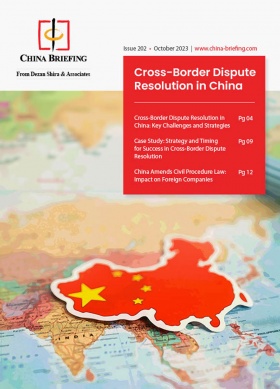Case Study: Strategy and Timing for Success in Cross-Border Dispute Resolution
Cross-border disputes have been increasing in China in recent years for a variety of reasons. This case study serves as a practical illustration of the available courses of action for foreign suppliers when their Chinese counterparts default on payments. It underscores the importance of adopting the correct strategy and taking timely measures when navigating cross-border dispute resolution.
Over the past three years, various factors, including the pandemic and geopolitical tensions, have injected a considerable amount of uncertainty into China’s business environment. Consequently, this has resulted in a notable uptick in commercial disputes.
One common type of cross-border dispute arises when domestic Chinese buyers encounter financial hardships or disruptions in their business operations, leading to their failure or reluctance to meet their payment obligations. This situation, in turn, leaves foreign suppliers struggling to promptly collect their due payments.
In this article, we aim to shed light on a recent case jointly managed by Dezan Shira & Associates and a well-established law firm.
Background
Our client is an Italian company specializing in the design, production, and sale of automotive components. It sells through a wholly-owned subsidiary registered in Shanghai. Since 2014, they have been supplying automotive components to a state-owned enterprise in Shanghai, hereinafter referred to as the “buyer.” By 2019, the buyer had accrued a payment arrearage of over RMB 8 million (approximately US$1.1 million) owed to our client.
Despite numerous reminders from our client, the buyer steadfastly refused to fulfill their payment obligations. They claimed that the components provided by our client had quality issues, which, according to them, resulted in losses of nearly RMB 9 million (approximately US$1.2 million). Faced with this challenging situation, our client sought the expertise of Dezan Shira & Associates to find effective solutions.
Arbitration of the sales contract dispute
Upon a comprehensive review of the sales contract, delivery orders, invoices, demand letters, and email correspondence exchanged between the involved parties, the professionals at Dezan Shira & Associates, in collaboration with the legal team from our partner law firm (hereinafter referred to as “the joint legal team”), advised the client of the impending likelihood that the buyer would initiate arbitration proceedings against them, potentially seeking asset preservation measures. Such a scenario would have placed our client in a less advantageous position. In order to avoid this situation, the client needed to take action first. Subsequently, after extensive communications, the client took our advice and decided to proactively initiate arbitration proceedings and pursue asset preservation.
In the arbitration request, our client not only sought immediate payment of outstanding amounts for goods already delivered, along with corresponding late payment penalties, but also demanded compensation for goods that had been ordered but not yet dispatched. Concurrently, adhering to the provisions of the Civil Procedure Law and arbitration rules, our client pursued asset preservation against the buyer. As a result, the competent court froze approximately RMB 8.8 million (approximately US$1.2 million) in the buyer’s bank account.
In response, the buyer alleged that our client had caused delivery delays and breached the contract, claiming damages exceeding RMB 14 million (approximately US$1.9 million). In a robust rebuttal, the joint legal team challenged the validity of the buyer’s claimed losses, the causal link, and the reasonableness of their assertions. Following a meticulous examination of the contested issues within the arbitration tribunal, the buyer found no recourse but to negotiate a settlement with our client.
Ultimately, the buyer agreed to pay 80 percent of the originally requested amount, resolving both our client’s claims and the counterclaims. Due to the timely asset preservation measures taken by our client, they promptly received the full settlement payment once the resolution was reached.
Lawsuits concerning product quality disputes
Subsequent to the resolution of the arbitration case detailed earlier, the buyer initiated legal proceedings against our client’s Italian manufacturing company, the product manufacturer, and the client’s Shanghai-based company, the product seller, in their local court. This lawsuit centered on product quality disputes, with the buyer seeking damages of approximately RMB 10 million (approximately US$1.4 million).
Upon receiving the court documents, our client’s Shanghai-based company promptly sought the expertise of Dezan Shira & Associates for assistance.
After extensive consultations involving the legal team, as well as thorough discussions with our client, it became evident that the factual and legal grounds underpinning the buyer’s lawsuit mirrored those of the previously settled arbitration case. In essence, the buyer’s lawsuit amounted to a repeated lawsuit, which by law should not be accepted by the court. Where the court has accepted the lawsuit, it shall rule to dismiss the lawsuit unless otherwise stipulated.
Additionally, the joint legal team advised our client that there were strong defenses available concerning the statute of limitations, actual damages, causality, and the reasonableness of the claims. Given these assessments and the practical considerations that engaging the Italian company’s lawyers in court proceedings would necessitate notarized authorization materials, entailing a substantial amount of time and cost, the joint legal team recommended that our client initially respond to the court and provide evidence in the name of the Shanghai-based company.
Furthermore, an email communication was established with the competent court handling the case through the contact person and email address publicly available on the official website of the Italian company. This communication confirmed the email address’s suitability for receiving court documents, effectively resolving the challenge of serving court papers. Crucially, these emails clearly conveyed that the Italian company’s stance on the case was fully aligned with that of the Shanghai-based company.
Following four court hearings and mounting pressure on the buyer, they ultimately chose to withdraw the lawsuit, thereby bringing an end to this protracted dispute.
Key takeaways
This case is a good example of how overseas sellers and suppliers can effectively handle cross-border disputes. It’s noteworthy that within the evidence presented by the buyer, it was revealed that the buyer had entered into a legal services contract with their lawyers and had made partial legal fee payments six months before our client initiated the arbitration. Had our client not proactively commenced arbitration and asset preservation proceedings, the course of this case might have encountered significantly more obstacles.
Reflecting on this case, the following valuable lessons can be learned:
- Early engagement of professional consulting: When confronted with situations where buyers default on payments and amicable negotiations and reminders prove futile, it is prudent to promptly involve a professional consulting firm to conduct an initial investigation into the buyer’s financial and litigation standing. This proactive step aids in formulating an effective strategy for potential disputes. In this instance, Dezan Shira & Associates had a history of collaboration with the client in areas such as business establishment, tax, legal, and human resources advisory. This prior engagement enabled a profound understanding of the client’s business model and operations, which made Dezan Shira & Associates a perfect facilitator in helping the client find suitable and experienced lawyers, seamlessly communicating with the joint legal team and the client, as well as forming the appropriate dispute resolution strategies.
- Right timing and strategy: Crafting a strategy that takes into account the client’s legal, tax, and operational complexity, coupled with timely action, is paramount to effective cross-border dispute resolution. In this case, following recommendations from the joint legal team, our client promptly initiated precautionary arbitration and asset preservation measures before the buyer could launch any arbitration or lawsuit. This dual approach had several benefits: it streamlined the resolution process, as arbitration is generally contractually based and more time-efficient than lawsuits; and it allowed our client to proactively manage the dispute, ensuring the smooth enforcement of the eventual settlement.
- Thorough preparation prior to arbitration review and court hearing: In disputes, the initial arbitration or lawsuit plays a pivotal role in settling not only the current issue but also any potential future conflicts. Meticulous preparation of evidence and related materials is pivotal to securing a favorable outcome. Moreover, active cooperation with the court, including assisting in resolving issues related to the service of court documents, can expedite the litigation process and indirectly contribute to resolving the dispute more efficiently.
(This article was originally included in the China Briefing Magazine issue Cross-Border Dispute Resolution in China.)
About Us
China Briefing is one of five regional Asia Briefing publications, supported by Dezan Shira & Associates. For a complimentary subscription to China Briefing’s content products, please click here.
Dezan Shira & Associates assists foreign investors into China and has done so since 1992 through offices in Beijing, Tianjin, Dalian, Qingdao, Shanghai, Hangzhou, Ningbo, Suzhou, Guangzhou, Dongguan, Haikou, Zhongshan, Shenzhen, and Hong Kong. We also have offices in Vietnam, Indonesia, Singapore, United States, Germany, Italy, India, and Dubai (UAE) and partner firms assisting foreign investors in The Philippines, Malaysia, Thailand, Bangladesh, and Australia. For assistance in China, please contact the firm at china@dezshira.com or visit our website at www.dezshira.com.
- Previous Article Shanghai’s Lingang New Area Launches First Cross-Border Data Service Center to Facilitate Data Export
- Next Article A Guide to China’s New Company Law for Foreign Investors – New Publication Out Now









